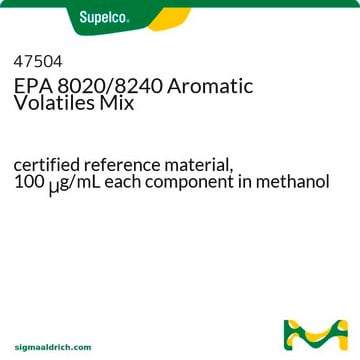75447
2-Oxoadipic acid
≥95.0% (HPLC)
Synonym(s):
α-Ketoadipic acid, 2-Oxoadipate, 2-Oxohexanedioic acid
About This Item
Recommended Products
Assay
≥95.0% (HPLC)
≥97.0% (T)
form
powder
lipid type
saturated FAs
storage temp.
2-8°C
SMILES string
OC(=O)CCCC(=O)C(O)=O
InChI
1S/C6H8O5/c7-4(6(10)11)2-1-3-5(8)9/h1-3H2,(H,8,9)(H,10,11)
InChI key
FGSBNBBHOZHUBO-UHFFFAOYSA-N
Looking for similar products? Visit Product Comparison Guide
Application
- Engineering of phenylalanine dehydrogenase from Thermoactinomyces intermedius for the production of a novel homoglutamate: Showcases the application of 2-oxoadipic acid in enzyme engineering, enhancing biocatalytic processes for the production of novel compounds, vital for pharmaceutical and chemical industries (Tariq et al., 2022).
Biochem/physiol Actions
Packaging
Signal Word
Warning
Hazard Statements
Precautionary Statements
Hazard Classifications
Eye Irrit. 2 - Skin Irrit. 2
Storage Class Code
11 - Combustible Solids
WGK
WGK 1
Flash Point(F)
Not applicable
Flash Point(C)
Not applicable
Personal Protective Equipment
Certificates of Analysis (COA)
Search for Certificates of Analysis (COA) by entering the products Lot/Batch Number. Lot and Batch Numbers can be found on a product’s label following the words ‘Lot’ or ‘Batch’.
Already Own This Product?
Find documentation for the products that you have recently purchased in the Document Library.
Customers Also Viewed
Our team of scientists has experience in all areas of research including Life Science, Material Science, Chemical Synthesis, Chromatography, Analytical and many others.
Contact Technical Service









